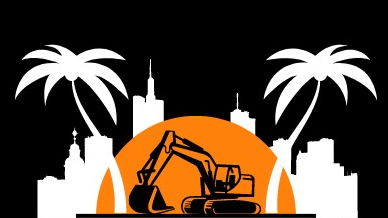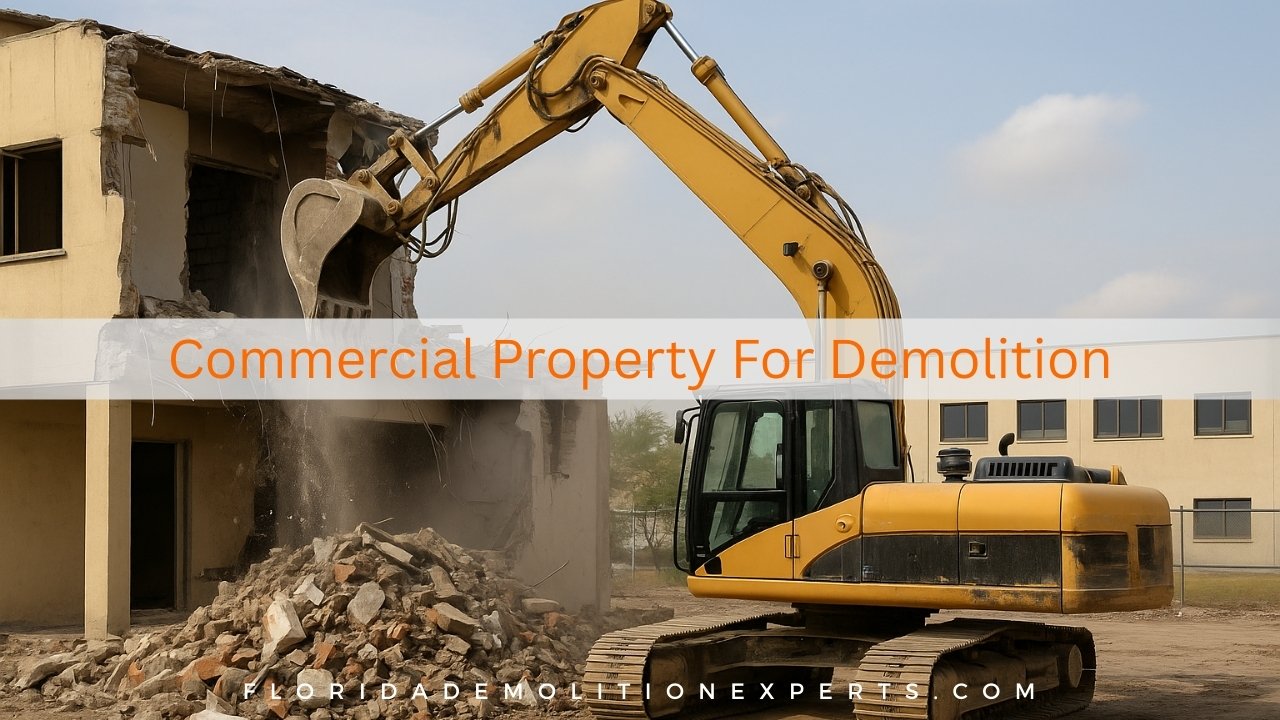Are you planning to demolish your commercial property in Florida but are unsure how to get started?
Demolition isn’t just about bringing in heavy machinery and tearing down walls.
In Florida, where regulations are strict and environmental conditions can add challenges, preparation is the most important step to ensure a smooth project.
Failing to prepare properly can lead to delays, costly fines, and unexpected safety risks. The good news is that you can keep your project on schedule and budget while staying compliant with Florida’s rules with the right approach.
This guide will cover preparing your Florida commercial property for demolition, from legal paperwork and inspections to site safety and contractor coordination.
How to Prepare Your Florida Commercial Property for Demolition (6 Steps)
Step 1: Secure the Necessary Demolition Permits
The first step in preparation is making sure your permits are in order. In Florida, demolition permits are issued at the city or county level (Miami-Dade, Orange, Hillsborough, Duval, etc.), and requirements vary depending on the location and building type.
What you’ll need:
- Licensed professionals prepared a demolition plan and site survey.
- Utility disconnection letters from gas, electric, and water providers.
- Asbestos and hazardous material inspection reports (mandatory for older buildings).
- Debris disposal or recycling plan, especially in counties with strict sustainability mandates.
For a deeper dive, check out our Florida Commercial Demolition Permits guide.
Step 2: Disconnect Utilities
Active utilities are one of the most significant safety hazards in demolition. Before demolition begins, confirm that all utilities are properly shut off and documented.
This includes:
- Electricity – the provider must disconnect power lines.
- Gas – capped to prevent fire or explosion.
- Water and sewage – shut down to avoid flooding or contamination.
- Telecom lines – fiber optic and phone services disconnected.
Pro tip: Get written confirmation from each provider. Florida inspectors often require proof of disconnection before approving demolition.
Step 3: Conduct Hazardous Material Inspections
Florida’s older commercial buildings frequently contain hazardous materials like:
- Asbestos insulation or tiles,
- Lead-based paint, and
- Underground fuel tanks or mold.
These must be identified and safely removed before demolition. By law, certified abatement specialists are required to handle asbestos and lead removal. Skipping this step risks fines and endangers workers and the surrounding community.
Step 4: Secure the Site
Site safety is non-negotiable. A poorly secured demolition site can result in accidents, theft, or public safety hazards.
Steps to take:
- Install fencing and signage around the perimeter.
- Arrange dust suppression systems, often required in urban Florida areas.
- Create clear access routes for heavy machinery and debris hauling.
- Notify nearby businesses and property owners; some counties mandate advance notice.
Step 5: Plan for Waste Management and Recycling
Florida has strict rules on debris disposal, especially in counties like Miami-Dade and Orange. You’ll need a waste management plan that covers:
- Where debris will be hauled (approved landfill or recycling center).
- How recyclable materials like concrete, steel, and wood will be separated.
- Proof of recycling, which may be required for permit closure.
Recycling isn’t just a legal requirement; it can save money by reducing landfill fees.
Step 6: Prepare Your Team and Contractor
Finally, make sure everyone involved in the project is aligned. Work closely with your demolition contractor to review:
- The demolition schedule and timeline,
- The safety protocols and emergency plans,
- The roles and responsibilities of each team member.
A Florida-based demolition contractor familiar with local codes can streamline this process and prevent costly mistakes.
Why Preparation Matters
Preparing your property for demolition isn’t just about compliance and protecting your investment. Skipping steps can cause:
- Permit delays,
- Unexpected costs, and
- Liability issues if accidents occur.
On the other hand, a well-prepared site means faster approvals, fewer risks, and smoother project completion.
Final Thoughts
Preparing your Florida commercial property for demolition requires more than a wrecking crew. It takes careful planning, permit approvals, utility shutdowns, hazard inspections, and site security. By investing in preparation, you’ll avoid costly setbacks and ensure your project runs efficiently from start to finish.
Ready to start your demolition project the right way?
At Florida Demolition Experts, we handle every preparation step from permits and utility coordination to hazardous material inspections and site safety.
Our team has years of experience managing demolition projects across Miami, Orlando, Tampa, Jacksonville, and beyond.
Contact us today for a free consultation and site assessment.






